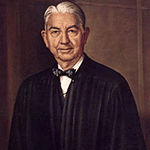
Tom Campbell Clark (1949-1967)
Tom C. Clark served as an Associate Justice of the Supreme Court from 1949 until 1967. Clark was instrumental in drafting several opinions for ground-breaking cases while on the bench.
Early Years
Clark was born on September 23, 1899 in Dallas, Texas. In 1918, he volunteered to serve in World War I with the U.S. Army. Clark later served with the Texas National Guard as an infantryman, and eventually advanced to the rank of sergeant. After the war, Clark attended the University of Texas at Austin, where he received an A.B. degree in 1921. He then decided to study law at the University of Texas School of Law, and was subsequently admitted to the Texas bar.
Legal Career
Clark practiced as a private attorney for several years. He left private practice in 1927 to serve as a civil district attorney in Dallas, but returned once again in 1932. In 1937, Clark joined the Justice Department as a special assistant to the U.S. Attorney General. After Pearl Harbor was attacked by the Japanese in 1941, Clark was appointed to the Alien Enemy Control Program, which oversaw the internment of Japanese Americans on the west coast. He later stated that the internment program was a mistake by the U.S. Government. In 1945, Clark was appointed by President Harry Truman as U.S. Attorney General, where he played a key role in pioneering the federal government’s support of civil rights enforcement.
Supreme Court Justice
In 1949, Clark was nominated by President Truman to the Supreme Court to serve as an associate justice. For much of his term, Clark served on the bench with Chief Justice Earl Warren. His opinions often varied, making it difficult to classify him as a liberal or conservative. While on the bench, Clark played a significant role in several ground-breaking civil rights cases, including Brown v. Board of Education (1954), Heart of Atlanta Motel v. United States (1964) and Katzenbach v McClung (1964). Clark also dissented in the landmark criminal procedure case Miranda v. Arizona, which held that the Constitution ensures an individual the right to remain silent.
Clark’s Constitutional ideology evolved during his time on the bench. Following his retirement, he stated that he came to understand the Constitution as a “living instrument which also must be construed in a manner to meet the practical necessities of the present.”
Death and Legacy
In 1967, Clark assumed senior status, retiring from the Court to avoid a conflict of interest so that his son, Ramsey Clark, could be appointed the U.S. Attorney General. He was succeeded by Thurgood Marshall, who became the first African-American Justice. Clark died on June 13, 1977 in New York City, New York.








